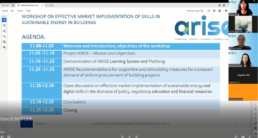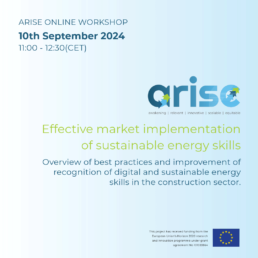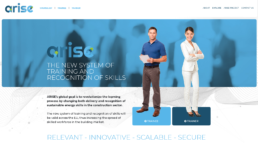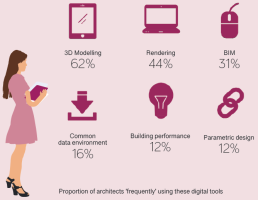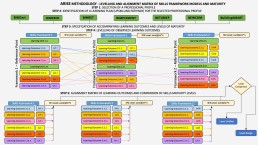ARISE H2020 Final Event on “Artificial Intelligence, Sustainability and BIM for Design and Construction upskilling”
Date: 15 October 2024
Time: 9:00 - 11:45 (CET)
Place: TU Dublin Bolton Street Campus, Dublin, Ireland
Registration link: https://www.eventbrite.co.uk/e/arise-h2020-final-event-tickets-1033490426687?aff=oddtdtcreator
In October 2024, the ARISE project officially concludes, but before that, we have an exciting event lined up.
Artificial Intelligence, Sustainability, and BIM for Design and Construction upskilling is a half-day and in-person event taking place at TU Dublin, Ireland. Join us and learn about the ARISE e-learning platform and its content on BIM applied to energy efficiency and the next steps of Artificial Intelligence in construction.
About the Project
ARISE is a European-funded project (by H2020 Grant Agreement No 101033864), started in September 2021, that aims to support the upskilling of design and construction professionals on the topics of energy-efficient buildings and BIM processes.
ARISE’s global goal is to revolutionize the learning process by changing both the delivery and recognition of sustainable energy skills in the construction sector. The new system of training and recognition of skills will be valid across the EU, thus increasing the spread of a skilled workforce in the building market.
By providing clear learning interactions, transparency of upskilling transactions and recognition of qualifications achieved, ARISE inspires demand for sustainable energy skills.
Agenda
| 9:00 - 9:15 | Welcome and Introductions |
| 9:15 - 9:45 | ARISE - Project, framework and platform |
| 9:45 - 10:15 | James Harty KEA Copenhagen - Anticipating and Adapting to Future Industry Trends |
| 10:15 - 10:30 | Coffee break |
| 10:30 - 11:00 | Jan Cromwijk - No transition without proper Skills & Timing |
| 11:00 - 11:30 | Jonathan Reinhardt - AI in Construction |
| 11:30 - 11:45 | Questions & Answers session |
| 11:45 – 12:00 | Closure |
ARISE PROJECT - Workshop on effective market implementation of sustainable energy and digital skills in construction sector
On 10 th September 2024, the ARISE Project organized an International Workshop on market implementation of sustainable energy and digital skills in the construction sector.
Designed as an online communication event, the main objective of the ARISE International Workshop was to allow the stakeholders of the building supply chain, from different countries, to share experiences and opinions on market demand and implementation of competencies in sustainable energy and digital skills, in the procurement of building projects.
Through a unique combination of presentation and discussion sessions, during which ARISE main achievements were presented and discussed with over 50 participants from more than 10 countries (UK, IE, PT, MK, NL,IT, BE, CR, EL, DK, etc.), with a variety of professional profiles in policy, procurement, academia, and industry.
Share of opinions, suggestions, and examples of good practices had transnational dimensions, as it was conducted through three modes of communication among the participants an interactive dashboard, live discussion and share of suggestions in online chat form.
The main takeaways were:
- There is a recognized need and recognized benefits at both supply and demand side, for including competences in sustainable energy anddigital skills in requerments of procureement of building projects,
- To start or intensify reforms in procurement in this direction, a set of measures needs to be considered, developed and deployed,
- All actors need should get involved and know their roles and responsibility of the process,
- Including private sector is very important, as most of the building stock (about 70 percent) are privately owned buildings,
- In the same time with starting / ongoing national reforms, efforts towards an internatonal common approach for recognition of skills should be enforced,
- International platforms enabling communication channels for share of best practices, such as ARISE, have an importnat role and ameaningful impact for the reforms initiation and start,
- ARISE demonstrated and tested prototype of approach and method of learning was found a way forward to resolve access to education and contribute to the increased demand for competencies in procurement:
- By its format of delivery that is suitable and feasible for professionals ( online, blended, micro modules, training plan, accumulative, non linear, customizable)
- By the way of recording the upskilling and facilitating cross region recognition ( micro badges)
- with a Framework that addresses the shortage of skills (4 groups, task based- micromodule framework)
The European construction sector opinions, collected during the event will be used by the project team to develop recommendations to all European countries to adopt a common approach for sustainable energy and digital skills demand and recognition, through a Framework of effective intervention strategies, impacts and advancement in policy, regulatory, financial stimulus and professional education improvements.
ARISE online workshop
Date: 10/09/2024
Time: 11:00 - 12:30 (CET)
Registration link: here.
Please find our event on BUILDUP
Title: "ARISE PROJECT - Workshop on effective market implementation of sustainable energy and digital skills in the construction sector."
About the Project
ARISE is a European-funded project (by H2020 Grant Agreement No 101033864), started in September 2021, that aims to support the upskilling of design and construction professionals on the topics of energy-efficient buildings and BIM processes.
ARISE’s global goal is to revolutionize the learning process by changing both the delivery and recognition of sustainable energy skills in the construction sector. The new system of training and recognition of skills will be valid across the EU, thus increasing the spread of a skilled workforce in the building market.
By providing clear learning interactions, transparency of upskilling transactions and recognition of qualifications achieved, ARISE inspires demand for sustainable energy skills.
About the Workshop
The Workshop will be organized as an online international communication event, to allow the stakeholders of the building supply chain from different countries to share experiences and opinions on market demand and implementation of competencies and skills in the procurement of building projects. The result of the event will be brought to the attention of the European stakeholders to propose recommendations to all member states to adopt a common approach.
The workshop will take place on 10th September 2024, from 11.00 to 12.30 CET, with the following agenda:
| 11.00-11.05 | Welcome and introduction; objectives of the workshop |
| 11.05 -11.10 | Project ARISE – Mission and objectives |
| 11.10 -11.25 | Demonstration of ARISE Framework and Platform |
| 11.25 -11.35 | ARISE Recommendations for supportive and stimulating measures for increased demand of skills in procurement of building projects |
| 11.35-12.10 | Open discussion on effective market implementation of sustainable energy skills in the domain of policy, regulatory, education and financial measures |
| 12.10-12.25 | Conclusions |
| 12.25-12.30 | Closing |
ARISE e-learning platform on BIM and applied energy efficiency tools. ARISE webinars for Trainees (17 th January 2024) and Trainers (21 st February 2024), Webinar recordings.
ACE has organised two successful webinars with the collaboration with BUILDUP Team in January and February 2024 on the topic of “ARISE e-learning platform on BIM and applied energy efficiency tools” addressed to Trainees and Trainers.
The EU funded project ARISE has launched the e-learning platform on BIM and energy efficiency in buildings for the design and construction sector. This e-learning platform provides micro-learning units available anywhere, anytime. The platform covers an introduction to BIM terms and definitions, BIM benefits, and BIM tools for energy. The short duration learning modules offer clear and straightforward content adapted to the busy life of professionals and workers. The learning pathway can be personalised to match the skill gap of each learner. In less than an hour of study, the learning units provide clear, straightforward content relevant to the working lives of professionals. The e-learning platform is a powerful tool for improving the skills of teams based in different locations. The e-learning platform is very crucial for the professional and workers upskilling and re-skilling is the cornerstone of the implementation of the digital transformation in the design and construction industry. Innovative learning methodologies, materials and tools are the foundation to reduce the labour shortage and increase the offer of digital skilled professionals.
First Webinar for Trainees: The first webinar provided information by ARISE Partner and Curriculum Area Manager Construction & The Built Environment Belfast Metropolitan College, Andrew Hamilton, on the topic of "Digitalization to the Built Environment: ARISE Approach." The presentation on the digital transformation of the design and construction sector addresses the labour shortages, the new interface of upskilling training, and the benefits driven by the digitalization of the sector. Among other topics, Andrew Hamilton outlined how the ARISE training methodology is flexible allowing people to step on or step off, recognising the various points of their career and educational experience to date. And also, for those with no educational experience, to bring them on board and align them to gain the skills they need to have jobs and roles across the various sectors. Besides, ARISE partner and Researcher at TUDublin Ryan Dempsey discussed on the topic of "ARISE e-learning platform and the microlearning contents" which are already available on the ARISE Platform website. He presented what will be offered to the user, such as the deployment of different tools and teaching methods to cater for different learning styles. The last part of the webinar provided information about the ARISE offers presented by ARISE partner and Responsible for the international affairs BuildingSmart Italy - IBIMI Anna Moreno. At the end of the session, most of the Trainees were interested in the ARISE e-learning platform and the contents of the platform that ARISE offers. The majority were also interested in learning about ARISE platform developers and content creators, modules, module contents, badges, and certification. If you miss the first webinar, catch up with the video recording here.
Second Webinar for Trainers: The second webinar started with a session about ‘Digitalisation to the Built Environment – ARISE approach’, which delved into the improvement digitalisation can bring to the building sector. Paul McCormack from the Belfast Metropolitan College. Then, Ryan Dempsey from TUDublin gave an overview of the ARISE platform and how trainers can use it as an e-learning tool and highlighted that trainers could use the ARISE platform as a learning materials database to tailor the courses for specific users’ classes. The final part of the webinar focused on ARISE framework by Jaap Kolk from Building Changes focusing on the ARISE framework structure, which comprehends BIM application, utilisation, support, and basics. He highlighted that the ARISE learning framework also helps within projects, by linking the skills needed to the people providing them. The webinar ended with an interactive podium discussion, facilitating an exchange of questions between the speakers and the audience. If you miss the second webinar, catch up with the video recording here.
Create your account and sign up for free at ARISE e-learning platform modules here.
Digitalisation: what is changing for architects?
An interview with Veronika Schröpfer, Head of EU Research Projects at the Architects’ Council of Europe
>> Digitalisation is changing the work of architects around the globe. At the moment there are around 560.000 architect in Europe, most of these working alone or in small offices. SMEs have the advantage to be quicker to adapt to new technologies and tools. Architects have shown themselves to be extremely willing to learn, more than half of those using each tool are self-taught. Architects are much more likely to use new tools out of personal or business interest than due to client or regulatory requirements. This shows that architects are enthusiastic to adopt digitalisation tools.
The role of the development of digital competences in the building domain
>> Architects contribute around 17 billion Euros to the EU economy (ACE, sector study 2020). Nevertheless, ACE has advocated for more diversity in software and tool providers. Annual licence fees for software can be a barrier for micro sized architecture practices. They cannot afford various licences for similar tools but different providers depending on the project. Hence the interoperability of tools and platforms are vital.
>> You can see in our 2020 ACE sector study, that there has been a proliferation of new digital tools which the architectural profession is adopting. A majority of architects use 3D modelling tools ‘frequently’, and nearly half use rendering tools frequently. About one in three architects frequently use BIM on their projects. An important aspect is that most architects use the tools out of their own choice.
The impact of putting in place a recognition system valid at European level
>> Our 2020 ACE Sector Study has revealed that the vast majority of architects taught themselves how to use digital tools.
No more than 35 per cent received formal training for any of the tools, although more received informal training. On average architects spend about 20 hours of official Continuing Professional Development (CPD) per year. CPD is a structured way of maintaining and developing the competence as a qualified professional by engaging in regular learning activities. For a training recognised and valid at EU level it should be endorsed by ACE Member Organisations in various EU Member States and meet the minimum agreed European quality standards. Various European training bodies should recognise each other’s CPD, making it easier for architects to work in the countries they choose. Usually, one learning hour equals one international CPD credit. Therefore, we joined the ARISE project, as it will work on the recognition of the CPD competences through the development of a platform based on microunits certified with blockchain.

Dr. Veronika Schröpfer, Head of EU Research Projects at the Architects’ Council of Europe
Images and sources of numbers from the ACE Sector Study: https://www.ace-cae.eu/fileadmin/user_upload/2020ACESECTORSTUDY.pdf
Desk research on maturity analysis of digitalisation and sustainable energy skills
The ARISE team is carrying out Desk research on maturity analysis of digitalisation and sustainable energy skills.
The research is led by IECE on models of digital and energy skills frameworks and maturity levels, and developed by several H2020 and Erasmus+ funded projects and international brands (bSI).
The comparative study will include multi-criteria evaluation of skills and qualifications frameworks, identifying the level of compliance and complementarity and specifying similarities and differences thereof, as a specific proof of the ARISE concept of international transact-ability of learning achievements and competencies. One of the study outputs will be a novel model of levelling and alignment matrix developed by the learning outcomes based methodological approach and tested within the team, on several selected professional profiles. In further steps, it will be aligned with the UNESCO and CEDEFOP methodology (2017) by considering NQF as a reference point, and suggested as a sectoral methodology of comparison, alignment and transfer of qualifications.
The report will be published in early Spring 2022.
Access the link below for more information:
https://www.ariseproject.eu/portugal/reports/
New Guideline on the use of BIM for energy performance
The current global warming trend is greater than the 1.5 degrees value established during the Paris climate change summit. World leaders reiterated the need to halve emissions over the next decade and reach net zero carbon emissions by mid-century to limit global temperature rise to 1.5 degrees.
The result of this policy is leading to the construction of new buildings with very high performance, but there is a strong need to improve the energy performance of the existing building stock.
Integrating BIM into national climate-change and energy policies is necessary and challenging, as many of these buildings lack reliable information, which BIM can help generate, exchange and, most importantly, archive so that they can be used in the future regardless of the software that generated them. The use of open standards is therefore not an option but an obligation.
The working group on energy efficiency active within IBIMI (Institute for BIM Italy), the Italian chapter of buildingSMART International, worked on the drafting of guidelines on how BIM can contribute to improving energy performance in each phase of the life cycle of a building
The guidelines can be downloaded free of charge from the websitewww.buildingsmartitalia.organd will be used as Body of Knowledge for buildingSMART International Qualification Program on Energy Performance.
We would be grateful if you take a few minutes to answer to a survey on the use of BIM to improve the energy performance of buildings. This will help us to draw the roadmap on the competences needs. At this link the survey:https://docs.google.com/forms/d/e/1FAIpQLScaXQ5eD_FI7AUcs0_C0v3DcdgH5_XDSNMZbVS2vEoju_ixZg/viewform
Digital Transformations - building services engineering article
Find the full article on the building services engineering website.
If industry is to develop and leverage its digital skills for energy efficient construction, and increase its competitiveness, it will be driven via the skills of the workforce. Upskilling must be demand-driven, demand both from the industry perspective and from the workers in the industry. It is this “meeting of demands” that will lead to success in meeting the needs of industry, society and the environment.
Digital transformation is a topical subject for all of industry and is seen as a key organisational strategy to support sustainable growth, especially in industries such as construction which is seen as a technology laggard. BIM is recognised as one of the main digital tools that are critical enablers that can embed digital processes within organisations. Specifically, the information management processes within BIM help companies in transforming traditional information processes and turning the information into data that is easier handled, used and analysed.

